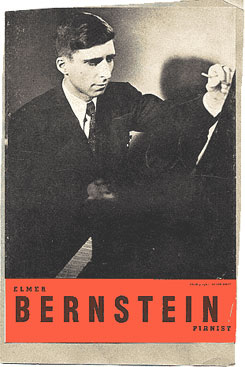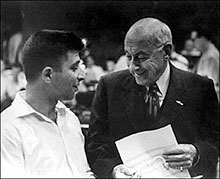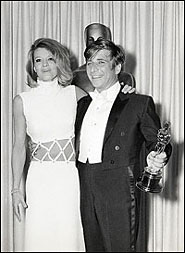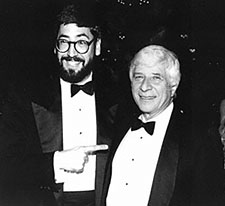

  |
|
|
||||||||||||||||||||||
|
FMS FEATURE... September 12, 2006 Concert Commemorates Elmer Bernstein Collection at USC 700 attend performance; composer's manuscripts, photographs and awards now on exhibit by Jon Burlingame  Program for Bernstein recital, 1947 The 75-minute concert coincided with the opening of "The Music of Elmer Bernstein: An American Soundtrack," an exhibit of scores, photographs, memorabilia and other material from the late composer's papers that were donated to the university by his family last year. The exhibit – which also includes Bernstein's Academy Award for Thoroughly Modern Millie and his Golden Globe for To Kill a Mockingbird – will run through Dec. 8 in Doheny Memorial Library on the USC campus. Members of the Bernstein family attended the opening and reception Friday night. The concert was a well-balanced program that featured both well-known themes and some that had never previously been performed in a live venue. Conducting the 65-piece orchestra and 18-member jazz band was David Spear, a longtime Bernstein associate who orchestrated such scores as Heavy Metal and Ghostbusters and conducted Bernstein's 1982 Broadway musical Merlin.  With Cecil B. DeMille, 1955 Peter Bernstein conducted a seven-minute medley of his father's pieces that had seldom, if ever, been played in concert. He began with "Silver," a shimmering piece written for Frank Sinatra's 1956 album Tone Poems of Color, and ended with the tender love theme from Desire Under the Elms (1958) and the rousing march from Stripes (1981).  With Angie Dickinson, receiving Oscar for Thoroughly Modern Millie, 1967 Spear conducted a six-minute suite from the moving score for Far From Heaven (2002), Bernstein's final feature film, and the end-credits music from the composer's lighthearted Three Amigos! (1986), to conclude the first half. Director John Landis came onstage to regale the audience with Bernstein anecdotes from his own experiences, hiring the composer to score National Lampoon's Animal House and several other comedies including the Oscar-nominated Trading Places. "He had such an impact on the culture," Landis said. "Elmer Bernstein made our movies better."  With John Landis, 1980s The audience gave the orchestra, and jazz band, a lengthy standing ovation. KUSC's Jim Svejda served as host. The concert is scheduled to be broadcast on KUSC at 12 noon Sunday, Oct. 1. All photos courtesy www.elmerbernstein.com ©2006 Jon Burlingame |
Search
Past Features
|